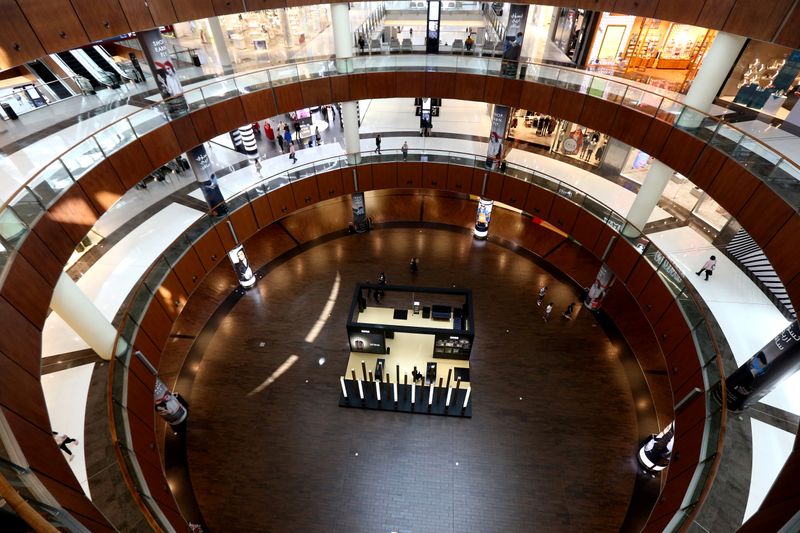By Hadeel Al Sayegh
DUBAI (Reuters) - Mall operators in the Gulf region are delaying new mega-projects as the coronavirus pandemic and low oil prices upend a retail industry built around huge centres catering to tourists and wealthy locals.
Majid Al Futtaim (MAF), the Middle East's biggest mall-operator, told Reuters it had delayed the launch of its fifth and largest centre in Oman, the 145,000 square-metre (1.5 million sq-ft) Mall of Oman, because retailers did not have the cash at hand to fit out stores.
In Dubai, Emaar Malls (DU:EMAA) halted construction on two projects, according to two sources familiar with the plans. They are a mall near the site of the Expo 2020 world fair, which has been delayed by a year to next October, and a 185,000 square-metre mall in the Dubai Hills residential area, the people said.
Emaar Malls, owner and operator of the world's largest shopping centre, Dubai Mall, did not respond to a request for comment.
"In malls under construction, timelines are being revisited. This is a fluid situation," MAF's Chief Executive Alain Bejjani told Reuters. "We will see how it goes and adapt," he added. "It will be the case for the coming 12 months."
Luxury malls, featuring international brands and entertainments such as dancing fountains and indoor ski slopes, have been the cornerstone of the oil-producing region's retail industry, especially during the blistering summer months.
A growing population and steady stream of tourists has seen more projects planned in recent years even as competition has intensified and footfall has levelled off.
Last year, Alpen Capital forecast the Gulf retail sector to grow from $253 billion in 2018 to $308 billion in 2023.
'ALL IN TOUGH SPOT'
The pandemic has changed the game in a matter of months, though.
Brick-and-mortar retailers have been among the worst hit by coronavirus closures. At Dubai's Mall of the Emirates last week, several shop fronts were boarded up and rental dispute notices hung in some shop windows, a visitor said.
EFG Hermes forecast a 20% drop in Dubai store-based sales in 2020 if foreign visitors were allowed entry in the third quarter, and a 40% drop if travel bans remain until year-end.
MAF, which operates 27 malls across the Middle East, said retailers in the Gulf region were not expecting a meaningful recovery for the sector in the next 18-24 months. Foot traffic at its malls in the United Arab Emirates in May was less than half of what it was a year ago, it added.
"They are all in a tough spot. They're focusing on liquidity issues," Bejjani said.
He said the impact was being felt, from retailers to companies in their supply chain. Some of the firms will "throw in the towel" this year, he added.
Kuwait's Alshaya Group, the Gulf's largest franchise operator with brands including Starbucks (NASDAQ:SBUX), Pottery Barn and The Cheesecake Factory, provided a grim outlook in April in an internal staff video seen by Reuters.
"Today, less than 5% of our stores are open ... Our revenues have shrunk by 95%, whilst our cost base has stayed the same," said acting Chief Executive John Hadden. "This is not sustainable for any business anywhere in the world."
Alshaya declined to comment.
RACE TO GO ONLINE
The slow move to online sales in the region has compounded retailers' problems.
Though malls reopened last month in the region's two largest markets, Saudi Arabia and the UAE, some customers still worry about COVID-19.
"I just looked at things from a distance and didn't buy anything," said Sahimaa in Riyadh. "I couldn't get myself to touch anything."
A senior executive at a large fashion conglomerate, who declined to be named, said 96% of sales last year in the Gulf came from malls, versus 4% from e-commerce.
"To get 80% from online, vs 20% brick and mortar - that's not gonna happen in the next 20 years," the executive said.
Online sales in Saudi Arabia accounted for about 0.8% of retail sales in 2018, and 1.5% in the UAE, according to a Boston Consulting Group report. By contrast, online grabbed more than 14% of retail sales in the United States in 2018, research firm Digital Commerce 360 found.
Many mall operators have offered a digital platform for shops to place products online to help cope with the pain.
MAF has placed some of the shops that sell household items on its Carrefour (PA:CARR) shopping marketplace, for example. Emaar Malls helped its tenants at Dubai malls place products on Namshi, an e-commerce website it owns, and Noon.com.
"People still stood on the fence, thinking e-commerce is in the future. Because of corona, they were forced to use the available technologies," said Rabih Khoury, partner at Dubai-based venture capital firm Middle East Venture Partners.
"You have to have the digital part. If you don't have it, it is as if you don't have a key location at a mall."
